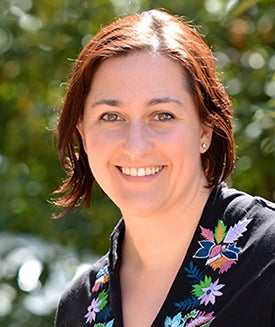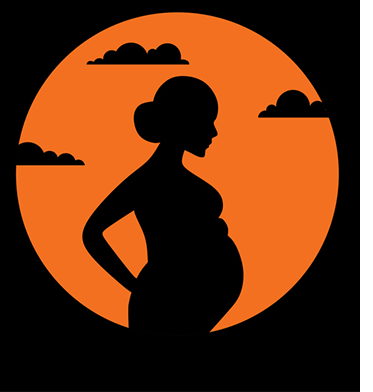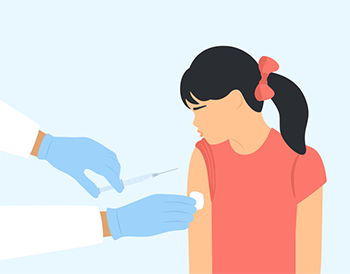
The federal administration offered health guidance at a press conference this week, urging pregnant women to avoid using the over-the-counter painkiller acetaminophen, marketed in the U.S. as Tylenol, saying use of the medication is associated with a higher risk of having children with autism spectrum disorder, or ASD.

The official statement by the Health and Human Services (HHS), however, differs from what was said in the press conference; it states that clinicians should “exercise their best judgment” when pregnant women have fevers or pain and prescribe acetaminophen at the “lowest effective dose for the shortest duration.”
We asked Katherine Meltzoff, a UCR associate professor in the School of Education, to answer questions about what’s known about Tylenol and its association with ASD. She also answers questions about autism and vaccines, the use of the drug leucovorin as a treatment, and concerns about autism misunderstandings. Meltzoff is a clinical psychologist who specializes in diagnosing ASD, the director of an autism center, and a neuroscientist who measures brain activity in children and adolescents with and without ASD.
Why do you feel compelled to speak out about this issue?
Meltzoff: ASD, commonly referred to as autism, is not political and affects children regardless of their parents’ political affiliation. I hope that my perspective and summary of what we know, what still needs to be studied, and what we think based on available evidence will help folks who are feeling confused, unsure, or frustrated by conflicting information. Please note that throughout this Q&A I use both “autistic” and “person with ASD.” This reflects increasing recognition that different people prefer different language.
Does acetaminophen cause autism? How do we know?
Meltzoff: Based on what we know, it is incorrect to recommend that expectant mothers not take Tylenol (acetaminophen). It is more accurate to tell people that there is a potential association between ASD and acetaminophen use, but not a causative one. Recommending judicious use (and consultation with a doctor) is more aligned with what the evidence says.
Here is a rundown of the most important research findings:
• Historically, the U.S. Food and Drug Administration (FDA) and European Medicines Agency considered acetaminophen safe to use during pregnancy. More recent studies suggest more caution. A consensus statement put out in 2021 by an international group of scientists and clinicians recommended that pregnant women avoid acetaminophen unless medically indicated due to the potential risk of developmental disorders, including ASD and attention-deficit hyperactivity disorder.
• A 2024 study of almost 2.5 million children in Sweden found that 7.49% of children were exposed to acetaminophen during pregnancy, and those children exposed to acetaminophen were slightly more likely to be diagnosed with ASD compared to those not exposed to acetaminophen. The absolute risk difference was .09% for ASD, meaning the risk of ASD at age 10 was .09% higher for those exposed to acetaminophen versus those unexposed.
However, when the authors controlled for genetic factors, acetaminophen was not associated with an increased risk of ASD. This was done by comparing the rate of ASD in cases where parents had multiple children and used acetaminophen in one pregnancy but not the other. This is important because we know ASD has a genetic component. The authors concluded that the most likely explanation for why associations have been observed between ASD and acetaminophen is due to a combination of factors, including parent genetics and the underlying conditions that cause acetaminophen use, such as fever, infection, and recurrent pain.
• A 2025 review of 46 previous studies found that 27 reported links between acetaminophen and ASD and/or ADHD, nine did not find any relationship, and four found negative associations (e.g., that acetaminophen might be protective against these diagnoses). Since this review was limited to previously published research, the conclusions are limited by the strength and accuracy of the 46 papers the authors reviewed. Still, the authors concluded that a “balanced approach” was needed and therefore recommended judicious use of acetaminophen rather than a limitation on usage.
Observational studies have shown a possible association between acetaminophen use and neurodevelopmental disorders, but not causation. Can you explain why this distinction is so critical in interpreting scientific results?
Meltzoff: Overall, the literature on this topic is complex and shows mixed results. However, it is important to remember that, thus far, no study has been able to systematically separate the potential effects of acetaminophen itself from the potential effects of the underlying reasons for taking acetaminophen (e.g., fever, illness, infection, headache). This is important because infections and fevers in pregnancy are associated with increased ASD risk, a 2018 study found.
There is an association between acetaminophen use and neurodevelopmental disorders in some studies, but thus far, it is only an association. Causation is different than association. Causation implies that we know that one thing causes another—even when accounting for other factors. A classic example of this is the association, or correlation, between shark attacks and ice cream sales. It is true that there is a positive association between shark attacks and ice cream sales. But does that mean that shark attacks cause ice cream sales, or that ice cream sales cause shark attacks? No. There is a third factor (hot weather) that explains increases in both shark attacks and ice cream sales. In the case of ASD, it is unlikely that there is one factor explaining both acetaminophen use and the increased prevalence of ASD. Rather, it’s more likely that multiple factors explain the association between acetaminophen and autism rates. But the overall point remains that it is important to remember that associations are different than causation. The FDA’s own statement about acetaminophen and ASD notes that a causative relationship has not been established.
Do vaccines cause autism? How do we know?
Meltzoff: Based on all the available evidence we have, vaccines, including the measles, mumps and rubella (MMR) vaccine, do NOT cause autism. A 2015 study reviewed records from 95,727 children. These children had older siblings either with a diagnosis of ASD or without a diagnosis of ASD. Nearly 7% of children who had older siblings with ASD were themselves diagnosed with ASD compared to .9% of children who had an older sibling without ASD. We interpret this as evidence that genetics plays a sizable role in ASD. The authors measured MMR vaccination rate at ages 2-5, along with the child’s diagnostic status. This was measured separately for children with and without an older sibling with ASD. Measuring these groups separately is important because there is concern that children who are genetically ‘at risk’ for ASD might be vulnerable to developing ASD in response to the MMR vaccine. The MMR vaccine was not associated with an increased risk of ASD, regardless of whether the child had an older sibling with ASD or not. There was no evidence that the MMR vaccine increased ASD diagnosis, even among children at ‘high risk’ due to genetic factors. These findings are consistent with numerous other studies that demonstrate a lack of association between vaccines and ASD.
A 2019 study of 650,943 children born in Denmark between 1999 through 2010 came to the same conclusion. It similarly compared vaccinated to unvaccinated children and found no association between MMR and ASD, even in subgroups who had a sibling diagnosed with ASD. A review also from 2019 discusses available evidence from multiple studies and comes to the same conclusion . While there are many unknowns when it comes to ASD, the science on autism and vaccines is clear.
Can leucovorin (folinic acid) “cure” or “reverse” autism? How do we know?
Meltzoff: It’s important to note that cerebral folate deficiency (CFD) has been found in some individuals with ASD—children have too little folate in their cerebrospinal fluid. However, CFD also causes other challenges beyond symptoms of ASD—seizures, coordination issues, etc. Previous studies suggest that mothers who supplement with folate during conception and pregnancy are less likely to have a child with ASD. A recent 24-week double-blind, placebo-controlled trial of 80 children (40 got placebo, 40 got folinic acid) found more improvements in parent-rated ASD severity in the folinic acid group versus the placebo group. Importantly, participants were tested for anti-folate receptor autoantibodies (which are thought to contribute to CFD in ASD). In the folinic acid group, children with high levels of autoantibodies showed more improvements than children with lower levels of the autoantibodies. This study is not the only one to find that folinic acid leads to improvements in ASD symptoms. A 2016 study, for example, had similar findings. Overall, evidence suggests that folinic acid can improve some autism symptoms and appears to be safe based on current research. However, the studies have included small numbers of participants, and the improvements reported are also small. More research is needed before we should recommend the use of folinic acid, and the FDA should follow its normal process before recommending broad usage for ASD. Despite what was said in the press conference, the official FDA statement says that leucovorin (folinic acid) can help with cerebral folate deficiency (CFD), not that folinic acid is approved for ASD itself. It is also important to remember that no studies have found evidence that folinic acid “reverses” or “cures” ASD. The symptom improvements are small, and there is no evidence that any child in any of the studies used folinic acid and went on to no longer have ASD.
How might unclear claims about autism causation affect the public’s understanding of this complex condition, especially among expectant mothers and caregivers?
Meltzoff: Scientists and clinicians working with this population have often quipped that it shouldn’t be called “autism” but rather “autisms” due to the complex and multifaceted nature of the condition, along with the variability that characterizes the autism spectrum. It is probable that the causes of autism are numerous (genetics, environmental factors, etc.). Claims that ASD is caused by a single factor are unlikely given that multiple genes have been implicated, along with other environmental and situational factors like fever and/or infection during pregnancy. Unfortunately, claims about single factors causing ASD, especially those that aren’t clearly supported by scientific evidence, are likely to worry expectant mothers and make caregivers confused due to conflicting information from different sources. It is important that mothers and caregivers talk to their doctor about any concerns they have.
What are your concerns about misunderstandings about autism?
Meltzoff: It is important to acknowledge that generalizations about autism can be harmful. Autism is characterized by a wide spectrum of needs—some autistic individuals excel in work and school and need little (if any) support. Others have higher support needs and may benefit from special education or other services. Individuals with the highest support needs, sometimes referred to as having ‘profound autism,’ often need consistent supervision and care. Recent research suggests that 39.6% of individuals with ASD have co-occurring intellectual disability, 36.1% have average or above average cognitive functioning, and the remaining 24.2% fall in the middle. Autistic self-advocates and their families have stated that claims about “curing” autism further stigmatization and misunderstandings about the condition. The neurodiversity framework seeks to increase recognition that all people (and all brains) are different—no two brains are the same. Understanding of neurodiversity calls for increased acceptance and decreased ‘pathologization’ of conditions like ASD, ADHD, and other forms of neurodivergence. This framework believes that every person should be valued and respected, and notes that many autistic people see autism as central to who they are rather than something they want to be “cured” of.
As a professional in the field, I believe that everyone should be able to make informed decisions about their own care and well-being. I think interventions or therapies for ASD should not be designed to make someone “less autistic,” but rather should help that person with important life skills for independence and thriving. For example, I think it is important for all individuals, including those with ASD, to have the ability to communicate with others. Communication can happen via sign language, via an assisted communication device, or verbally. It is less important how someone communicates, and more important that we attempt to give them the ability to communicate, since being unable to communicate is frustrating. When autistic children engage in self-injurious behaviors such as head banging, my highest priority is to figure out why they are engaging in that behavior and to practice safer alternatives. For a teenager who wants to make more friends, my priority is to help that person come up with strategies for talking to new people and to practice skills for making and keeping friends. If the teenager learns those skills and decides they don’t want to use them, that should be their choice. No one should be forced to be ‘more neurotypical’ or ‘less autistic.’ Rather, people’s autonomy and choices should be respected while still providing necessary support and practicing skills that can help them thrive.





